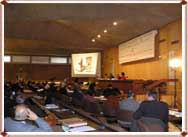7 May 2004 : Closing address of the International Symposium “Cultural Diversity and Globalization, the Arab-Japanese Experience, a Cross-Regional Dialogue”
Statement by Mr Seiichi Kondo, Former Under Secretary-General of OECD, Director-General of the Cultural Affairs Department , Ministry of Foreign Affairs of Japan
(Note : Mr Seiichi Kondo has been Permanent Delegate of Japan to UNESCO between September 2006 and Mid-August 2008)
©Delegation of Japan to UNESCO
"Many experts have analyzed dialogue by looking at some key concepts such as: culture and identity, modernity, modernization, colonization and its impact, globalization and its impact, etc. These are all essentially important concepts to further explore when we engage in a dialogue. However; we do not need to seek for consensus on these concepts; rather we should explore our own thoughts behind these concepts.
The comparison of the experiences of Japan and Egypt in the nineteenth century was very interesting and useful in that it focuses attention on the previously mentioned concepts. The analysis of how Japan was able to successfully modernize while maintaining its traditional value systems suggests that further case studies could be useful in a future dialogue.
However, one thing is clear, we cannot transfer modernity or ability to modernize itself from one country to another:
The real keyword for the dialogue among civilizations is "tolerance". In order to engage in a real, genuine dialogue we have to be tolerant; we need to trust others. If we fear others we cannot engage in a dialogue. This concerns the issue of history. As Prime Minister Nehru said, "History is written by winners and conquerors."
Thus, several questions arise:
Do we need to rewrite history?
Can we forget about history?
Can we forget the past and still have a bright future?
Can we abandon a strong sense of mission, or as Professor Naito said, progressivism" or "universalism", for the sake of respect for diversity?
Can we be ready to change during and after the dialogue?
Those are the questions we have to keep asking in future dialogues. Human nature also needs to be taken into account during a dialogue. Human beings are shaped by their locality; therefore, politics is also locally defined. On the other hand, economy technology and information are global which lead to competition, which produces winners and losers. Politicians feel tempted to create outside enemies to enhance internal or domestic cohesion and to divert people's attention from domestic problems. Generally, people also accept diversity only when there is a common enemy. Therefore, how can we ensure that we can reach genuine cosmopolitanism?
To conclude, let us consider a few points on possible paths of action for the future. Many analysts mentioned the importance of education, but it is important to consider who writes the textbooks and the synopsis.
The idea that an exchange of students will promote respect for cultural diversity is certainly true. The earlier we undertake international experiences in ourlives, the better. The Japanese Government has traditionally organized a big ship for youth programmes. Three hundred young students from 30-40 different countries are sent on a voyage for 40 days. This really promotes mutual understanding, and this kind of physical environment can be helpful.
In addition, cultural events and cultural exchanges can be very useful. Artistic expression can express more than words. We tend to depend on words only, and words are useful in delivering logical messages in a way, but sometimes we feel the limit of the capacity of our words. Therefore, using artistic expression and cultural tools to promote mutual understanding is recommended.
Dialogue is not an end but a process. It is about seeking the truth, and therefore, we should plan to continue this kind of dialogue. Probably we can invite parties from outside. We had the pleasure of having a professor from Germany with us at the dialogue. We may be able to benefit from the presence of people other than Japanese and Arab people in a future dialogue.
The real question is, as Mr Salamé said," Are we ready to change?"
Dialogue is not a means to try to convince someone. Dialogue is an action, and both sides have to be ready to change. So this is the important concept to keep in mind when we continue the dialogue in the future.
I propose that the artwork of Mr Tanaka and Mr Massoudy be the symbol of flexible dialogue. We are not talking about standardization or uniforms but this art symbolizes readiness to change and readiness to make a commitment to genuine dialogue. I solemnly declare that the Japanese Government will continue to support the continuation of this dialogue in UNESCO. "
Links
On 6 May 2004, Mr Teiichi Sato, Permanent Delegate of Japan to UNESCO (until September 2006) opened the above symposium with a speech.
Legal Matters | About Accessibility | Privacy Policy
Copyright : 2013 Permanent Delegation of Japan to UNESCO
